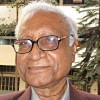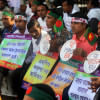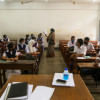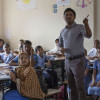How does the law support teachers in Bangladesh?

As a nation, we have always been respectful to our teachers for their kindness, hard work, patience, dedication, and thoughtfulness that provide positive directions to their students. The profession of teaching in primary or secondary schools is regarded with high respect not only because of the teachers' patience and sacrifice, but also their invaluable contribution to the life of a learner. It is not possible to measure their contribution in educating children and shaping them into the future leaders of a nation.
But the time has come to ask ourselves: why do we see teachers go on a hunger strike? Why do teachers come to the streets to claim their pay and allowances? Why are there so many individual initiatives, but no concerted efforts representing the teachers' voices? The list of questions may be long, but let's focus on only one issue in this column.
How does the law of Bangladesh address the rights and protection of teachers? Perhaps addressing this single question will shed some light to the questions above. A little bit of background, however, is necessary.
We recently spoke to around 50 teachers and tutors from primary and high schools, both Bangla and English medium. We also looked at gender as well as rural and urban settings of the schools across the country while selecting the teachers. We wanted to know their experiences regarding health and safety issues as they taught online during or after Covid.
In our discussions, it came out that there was no policy or law to address the health safety of teachers, although most forms of work and workers in the country are covered by the Labour Act, 2006 or the labour ministry's recent draft on occupational safety and health (OSH). Reflecting on our study, we tried to delve into the factors behind the context of teachers' protection issue remaining outside of the law's purview. We found that teachers are not recognised as workers by the legal or policy protocols. This vacuum needs to be further explored urgently for the sustainable and social development of Bangladesh, to be ushered in by a sustainable education system. Undoubtedly, cultural hypocrisies and ambivalence regarding the image of teachers have something to do with this situation.
Teachers' health and safety issues were in fact never considered important, not even during the pandemic, when schools faced rapid shutdown. Teachers had to switch to online teaching although most of them were unequipped to conduct online classes. Our research found that they had faced tonnes of challenges and barriers, including technostress, online classes affecting work and family life, different health problems caused by device-dependent teaching, and other issues. Sadly, most of them were not supported adequately with technology and training. Yet, most of them did well based on their own efforts and motivations.
Our society constructed the identity of teachers as very honoured and dignified individuals, using glorified terminologies such as "next to parents," "role models," "nation-builders," etc. But at the end of the day, they are one of the most vulnerable employee groups in terms of social protection and benefits. Although teachers of full government schools are secured in terms of salary and retirement benefits to some extent—which is a very small percentage—there is the bigger teachers' community who serve in the private or semi-government schools, such as private primary schools, kindergartens, schools with MPO status, English medium schools, and madrasa, where teachers have zero security from the government or the school authorities.
One may ask whether teachers have unions in Bangladesh. The answer is "yes," but, interestingly, they are divided into several factions in terms of political ideologies and/or their own agenda and interests. Teachers (and leaders) of these unions, based on our research findings, are able to hold various top positions in the government/different departments related to education administration. Hence, the teachers' community has nowhere to seek help when it comes to their rights and protection. Isn't it enough for the teachers to get frustrated?
There is no one to fight or lobby for the general teachers to negotiate their rights with the government. The unions have no formal legal basis simply because the (teachers') group is not treated as an important workforce in the country by law.
So, what is the future of this working population? According to the World Bank (2022), there are 359,095 primary school teachers in Bangladesh. According to Banbeis (2022), the number of regular secondary education teachers is 247,013 (excluding the English medium, madrasa and other streams). The uncertainty with the rights and protection of this huge number of teachers is exacerbated by the absence of their recognition in the labour law, which means they are not entitled with collective bargaining power.
The cultural sensitivity of the teachers' own views about themselves cannot be ignored either. Many of the teachers would find being identified as "workers" less respectful, if not derogatory. We may call it a cultural dilemma from the teachers' perspectives and negligence from the state's perspective. This dilemma and negligence make their future more complicated, because teachers have to decide what they should do—whether they will be grouped with other working communities with a view to being covered by the existing protocols for their greater interest, or they will demand for a separate and independent policy for themselves. The prospects for the latter seem less bright because they don't have enough collective strength to make the government accountable within a short time. Without a strong collective bargaining platform, it is almost impossible.
We must note that the government has core constitutional obligations (Article 18) to provide education to children. The Primary Education Act, 1990 also makes it mandatory to provide education to children. If it does not happen, it will be a violation of a fundamental state policy. And you cannot provide education without teachers. Therefore, not just to continue proper delivery of education, but also to protect the rights of the teachers, the government should act now to ensure and protect teachers' rights. We cannot let the existing situation continue.
Dr Tauhid Hossain Khan is associate professor of sociology at Jagannath University.
Dr Ishrat Zakia Sultana is assistant professor at the Department of Political Science and Sociology in North South University.
Mohammad Imam Hossain is advocate at the Supreme Court of Bangladesh and the author of the book Labour Law of Bangladesh.
Views expressed in this article are the author's own.
Follow The Daily Star Opinion on Facebook for the latest opinions, commentaries and analyses by experts and professionals. To contribute your article or letter to The Daily Star Opinion, see our guidelines for submission.

 For all latest news, follow The Daily Star's Google News channel.
For all latest news, follow The Daily Star's Google News channel. 











Comments